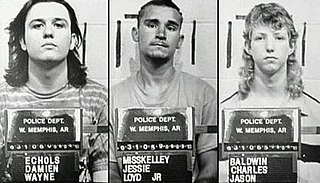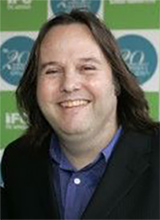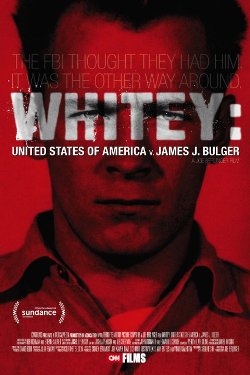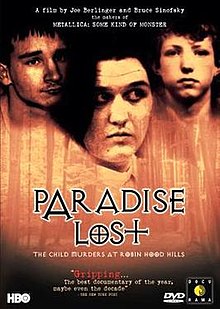
The West Memphis Three are three men convicted as teenagers in 1994 of the 1993 murders of three boys in West Memphis, Arkansas, United States. Damien Echols was sentenced to death, Jessie Misskelley Jr. to life imprisonment plus two 20-year sentences, and Jason Baldwin to life imprisonment. During the trial, the prosecution asserted that the juveniles killed the children as part of a Satanic ritual.

Paradise Lost 2: Revelations is a 2000 American documentary film directed and produced by Joe Berlinger and Bruce Sinofsky, and the sequel to their 1996 film Paradise Lost: The Child Murders at Robin Hood Hills, about the trials of the West Memphis Three, three teenage boys accused of the May 1993 murders and sexual mutilation of three prepubescent boys as a part of an alleged satanic ritual in West Memphis, Arkansas.

Metallica: Some Kind of Monster is a 2004 American documentary film about American heavy metal band Metallica. The film follows the band from 2001 to 2003, a turbulent period in the band's history which included the production of their 2003 album St. Anger, frontman James Hetfield entering into rehab for alcoholism and the departure of bassist Jason Newsted as well as the hiring of his replacement Robert Trujillo. The title of the film shares its name with the song of the same name from St. Anger.

Free the West Memphis 3 is a compilation album released in October 2000 by Koch Records as a benefit for the legal defense of the West Memphis Three, three men who, while teenagers in 1994, were tried and convicted of the 1993 murders of three boys in West Memphis, Arkansas. The album was organized by guitarist Danny Bland, Eddie Spaghetti of the Supersuckers, and Scott Parker, who served as executive producers of the project.

Joseph Berlinger is an American documentary filmmaker and producer. Particularly focused on true crime documentaries, Berlinger's films and docu-series draw attention to social justice issues in the US and abroad in such films as Brother's Keeper, Paradise Lost: The Child Murders at Robin Hood Hills, Crude, Whitey: United States of America v. James J. Bulger and Intent To Destroy: Death, Denial and Depiction.

Bruce Sinofsky was an American documentary film director, particularly known for his films the Paradise Lost trilogy, Brother's Keeper and Metallica: Some Kind of Monster, all created with Joe Berlinger.
Paradise Lost is an epic Christian poem by John Milton.

Kelly Duda is an American filmmaker and activist from Arkansas best known for the 2005 documentary, Factor 8: The Arkansas Prison Blood Scandal.
Stephen L. Braga is an American lawyer, best known for his pro bono representation of Martin Tankleff and the West Memphis Three. He also represented Michael Scanlon, the number two target in the Jack Abramoff Indian lobbying scandal. Braga is currently the Director of the Appellate Litigation Clinic at the University of Virginia School of Law. In addition, he chairs the national white collar practice at Bracewell LLP.

Devil's Knot: The True Story of the West Memphis Three is a 2002 true crime book by Mara Leveritt, about the 1993 murders of three eight-year-old children and the subsequent trials of three teenagers charged with and convicted of the crimes. The names of the three teens convicted - Damien Echols, Jason Baldwin, and Jessie Misskelley - would come to be known as the West Memphis Three. Leveritt's book revolves around the central idea that the three teenagers' convictions stemmed from "Satanic panic" rather than actual evidence. The book also focuses on one of the victim's stepfathers and his possible connection with the murders. All three teenagers convicted were released on August 19, 2011. A film based on the book, Devil's Knot, was released in 2013.
Joe Berlinger and Bruce Sinofsky were a team of American documentary filmmakers that have won cult fame and critical acclaim. The duo are probably best known for their trilogy of Paradise Lost films about the so-called West Memphis Three, and for their 2004 Metallica documentary Metallica: Some Kind of Monster. Though they often worked together, Berlinger and Sinofsky also separately directed their own projects.
David Burnett is an American Democratic politician and former member of the Arkansas Senate. Before he entered the Senate, Burnett had been a judge. Burnett is known as the trial judge of the controversial West Memphis Three trial during which he made several serious mistakes.

Paradise Lost 3: Purgatory is a 2011 American documentary film directed by Joe Berlinger and Bruce Sinofsky, and sequel to their films Paradise Lost: The Child Murders at Robin Hood Hills (1996) and Paradise Lost 2: Revelations (2000). The three films are about West Memphis Three, three teenage boys accused of the May 1993 murders and sexual mutilation of three prepubescent boys as a part of an alleged satanic ritual in West Memphis, Arkansas. Purgatory offers an update on the case of the West Memphis Three, who were all recognized guilty of the murders in 1994 but kept on claiming their innocence since then, before culminating with the trio's attempt at an Alford plea.

50 Documentaries to See Before You Die is a 2011 television special aired on Current TV. Presented by Morgan Spurlock, the series features a ranking of fifty documentary films.

West of Memphis is a 2012 New Zealand-American documentary film directed and co-written by Amy J. Berg, produced by Peter Jackson and Damien Echols, and released in the US by Sony Pictures Classics to critical acclaim. It received a nomination for Best Documentary Screenplay from the Writers Guild of America.

Devil's Knot is a 2013 American biographical crime drama film directed by Atom Egoyan. Adapted from Mara Leveritt's 2002 book of the same name, the film is about the true story of three murdered children, and the three teenagers known as the West Memphis Three who were convicted of killing them, during the Satanic ritual abuse panic. The teenagers were subsequently sentenced to death (Echols) and life imprisonment, before all were released after eighteen years. Produced by Elizabeth Fowler, Richard Saperstein, Clark Peterson, Christopher Woodrow, and Paul Harris Boardman, the film stars Colin Firth, Reese Witherspoon, Dane DeHaan, Mireille Enos, Bruce Greenwood, Elias Koteas, Stephen Moyer, Alessandro Nivola, Amy Ryan, and Martin Henderson.

Whitey: United States of America v. James J. Bulger is a 2014 American biographical documentary film produced and directed by Joe Berlinger. It is produced by CNN Films and Radical Media. Its world premiere was at the 2014 Sundance Film Festival on January 18, 2014.

Elisabeth Holm is an American film producer and screenwriter. She produced the 2014 film Obvious Child and was formerly the film program director at Kickstarter.
The Center on Wrongful Convictions of Youth, part of Northwestern University Pritzker School of Law's Bluhm Legal Clinic, is a non-profit legal clinic that represents children who have been convicted of crimes they did not commit. Founded by Northwestern Law Professor Steven Drizin and directed by Professor Laura Nirider, it is the first organization in the world to focus exclusively on wrongfully convicted children. Through its intertwined research, scholarship, teaching, and advocacy, the Center has developed expertise in the problem of false confessions, police interrogation practices, and constitutional doctrine governing the interrogation room.

Damien Wayne Echols is an American writer, best known as one of the West Memphis Three, a group of teenagers convicted of a triple murder. Upon his release from death row in 2011 under an Alford plea, Echols authored several autobiographies and spiritual books. He has been featured in multiple books, documentaries, and podcasts about his spiritual works and the West Memphis Three case.















